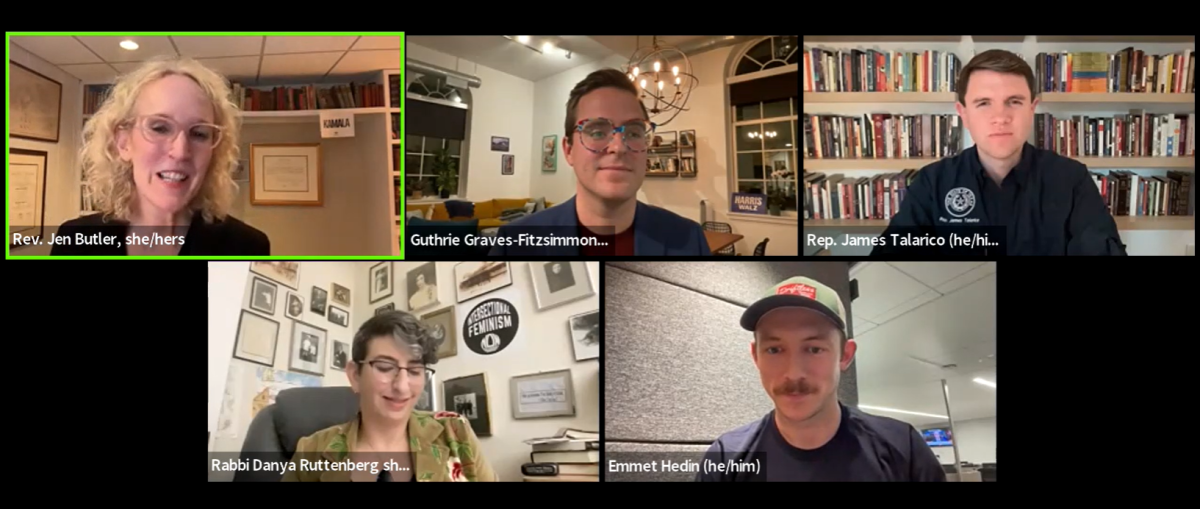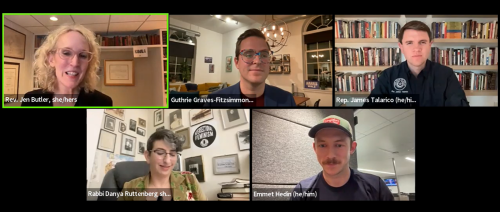
Before Tim Walz and J.D. Vance took the debate stage on Tuesday (Oct. 1), Faith for Harris-Walz held a vice presidential pre-show panel discussion featuring several influential religious leaders. Led by Rev. Jen Butler, Presbyterian minister and head of the Harris-Walz campaign’s faith outreach, this virtual event was intended to create an opportunity to discuss the moral stakes of the election and to highlight contrasts in values between the two candidates.
“I will never forget Trump trying to remove 20 million people from health care. I’ll never forget when he imposed the Muslim ban and when he refused to condemn Nazis and White Supremacist groups in Charlottesville,” said Rev. Butler. “This time would be worse because Project 2025 is a 900-page battle plan for ending democracy.”

Screengrab during the Faith for Harris-Walz pre-debate faith event on Oct. 1, 2024.
Guthrie Graves-Fitzsimmons, senior director of policy and advocacy at Interfaith Alliance and author of Just Faith: Reclaiming Progressive Christianity, then brought a Baptist perspective to the discussion. As he pointed out that it was the 100th birthday of former President Jimmy Carter, he said that “like President Carter, Vice President Harris is informed by her Baptist faith in love of neighbor and commitment to service.”
“Like President Carter, she also knows that religion shouldn’t be imposed on others, that faith is best when it’s freely chosen — and she respects religious freedom,” which Graves-Fitzsimmons argued is on the line in this election.
Rev. Angela Denker, a Lutheran pastor, columnist, and author of Red State Christians: Understanding the Voters Who Elected Donald Trump, used her time to reflect on what it is like to have someone on the ticket from her state and denomination, the Evangelical Lutheran Church in America. She told those gathered that Lutheranism was founded on the idea that “we’re saved not because of who we are but because of who God is.”
“Because we worship this big, inclusive God, in response, we get to go out and act with a sense of joy and a love for our neighbors. And I’ve really seen that in Tim Walz. And it’s been so refreshing to see that religion can be practiced as a response of joy, rather than sort of this exercise of finding out who to hate or who to go against,” she added.
The most detailed reference to religion in the following debate came from Walz as he cited the Bible when discussing a proposed immigration bill.
“I don’t talk about my faith a lot, but Matthew 25:40 talks about, ‘To the least amongst us, you do unto me,’” he said. “Americans, they simply want order to it. This bill does it. … And it lets us keep our dignity about how we treat other people.”
The pre-debate event also considered Vance and religion.
“[Vance’s] Catholicism is a little bit different,” said Dr. Anthea Butler, professor, columnist, and author of White Evangelical Racism: The Politics of Morality in America. From her Catholic perspective, his religious framework is all about exclusion.
“What he talks about, and what he’s enforcing, is a kind of Catholicism that is called integralism. And basically, integralism is the way in which you think about the church being mixed with the state,” Dr. Butler added. “It’s very dangerous because it’s a way to put in the most, I would say, the most dire and the most authoritarian aspects of Catholicism into our governmental process.”
Those attending the Faith for Harris-Walz event were also invited to join a virtual post-debate response put on by Vote Common Good podcast producer Daniel Deitrich and executive director Doug Pagitt recording live from Dallas, Texas. They are currently on a bus tour that, in the words of Deitrich, is “trying to spread a little faith, hope, and love around the country — to support democracy for all.”






